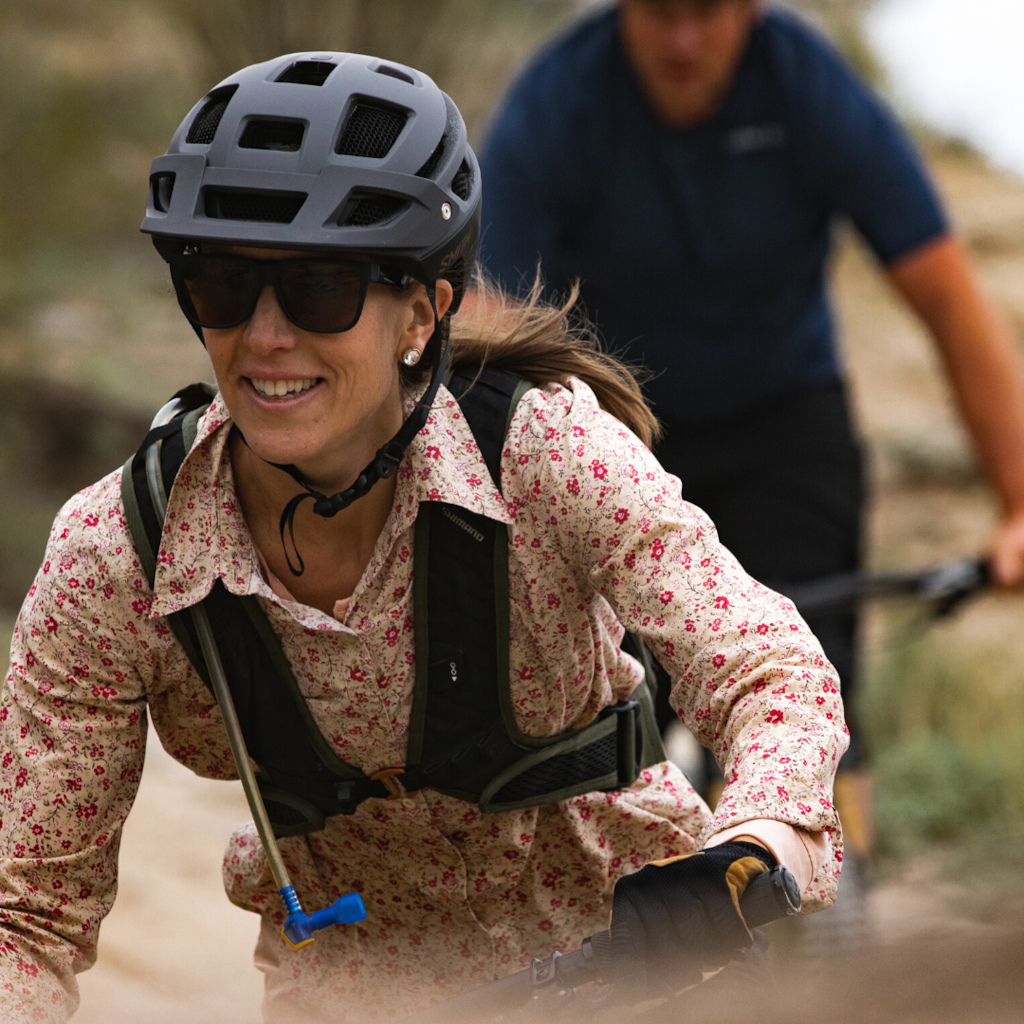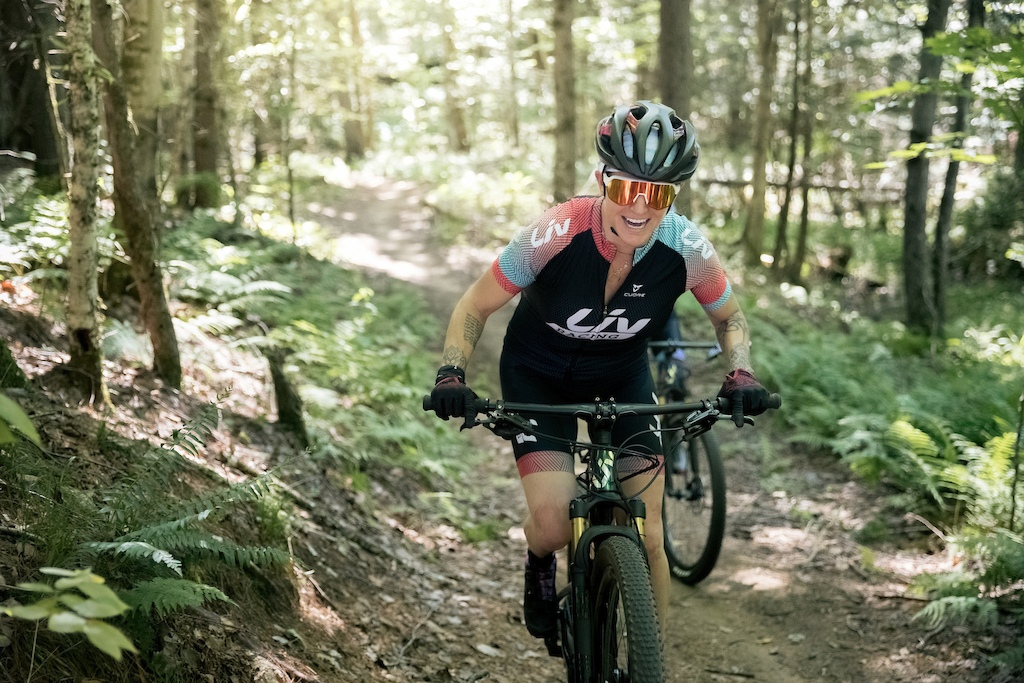The Pinkbike Podcast: Episode 28 - All About Women's Bikes
Inspired by our "Things We Were Wrong About" podcast, we discuss the advantages and disadvantages to different approaches that brands take to women's bikes. I also interviewed three of the industry's leading female marketers from three brands with very different approaches. We chatted with Kelli Emmett, the Brand Manager at Juliana Bicycles, Brook Hopper, the Global Marketing Manager at Liv Cycling, and Elorie Slater, the Marketing Manager at Pivot Cycles. All three came to cycling from different backgrounds and work for brands that have entirely different approaches to designing bikes and marketing to women, which made for an interesting conversation.
PS. What's the lamest MTB marketing copy you've ever read? Let us know in the comments. We need a good punishment ad read for Levy when he's back from testing fields.
Available on Apple Podcasts, Spotify, Google Play, or wherever else you get your podcasts.
Elorie Slater, Pivot Cycles Marketing Manager
Having cut her cycling industry teeth as a mountain bike shop owner, Elorie has sought to open doors for female-identifying riders with each new professional opportunity. She now serves as the Marketing Manager at Pivot Cycles, teaches dealer training workshops, and sits on the advisory board for Ride MTB Day.
Having cut her cycling industry teeth as a mountain bike shop owner, Elorie has sought to open doors for female-identifying riders with each new professional opportunity. She now serves as the Marketing Manager at Pivot Cycles, teaches dealer training workshops, and sits on the advisory board for Ride MTB Day.
Kelli Emmett, Juliana Bicycles Brand Manager
Long time XC and Enduro athlete Kelli Emmett transitioned from racing to working for Juliana Bicycles in Sports Marketing a few years ago. She is currently the Brand Manager of Juliana and interested in helping those who identify as women progress in mountain biking.
Long time XC and Enduro athlete Kelli Emmett transitioned from racing to working for Juliana Bicycles in Sports Marketing a few years ago. She is currently the Brand Manager of Juliana and interested in helping those who identify as women progress in mountain biking.
Brook Hopper, Liv Global Marketing Manager
Brook is the Global Marketing Manager for Liv Cycling. A former XC racer herself, Brook has been in the outdoor industry for 20 years and is a passionate defender of justice, equity, diversity and inclusion, and draws inspiration from her daughter in her efforts to fight for a better and more equitable world.
Brook is the Global Marketing Manager for Liv Cycling. A former XC racer herself, Brook has been in the outdoor industry for 20 years and is a passionate defender of justice, equity, diversity and inclusion, and draws inspiration from her daughter in her efforts to fight for a better and more equitable world.
THE PINKBIKE PODCAST // EPISODE 28 - ALL ABOUT WOMEN'S BIKES
Oct 29th, 2020
We discuss the benefits and disadvantages to different approaches that brands can take to getting more women riding bikes.
Hosted by Mike Levy (usually) and featuring a rotating cast of the editorial team and other guests, the Pinkbike Podcast is a weekly update on all the latest stories from around the world of mountain biking, as well as some frank discussion about tech, racing, and everything in between.
Previous Pinkbike Podcasts
Episode 1 - Why Are Bikes So Expensive?
Episode 2 - Where the Hell is the Grim Donut?
Episode 3 - Pond Beaver Tech
Episode 4 - Why is Every Bike a Trail Bike?
Episode 5 - Can You Trust Bike Reviews?
Episode 6 - Over Biked Or Under Biked?
Episode 7 - Wild Project Bikes
Episode 8 - Do We Need an Even Larger Wheel Size?
Episode 9 - Why Are We Doing a Cross-Country Field Test?
Episode 10 - Getting Nerdy About Bike Setup
Episode 11 - Are We Going Racing This Year?
Episode 12 - What's the Future of Bike Shops?
Episode 13 - Are Bikes Too Regular Now?
Episode 14 - What Bikes Would Pinkbike Editors Buy?
Episode 15 - What's Holding Mountain Biking Back?
Episode 16 - Who's Your Mountain Biking Hero?
Episode 17 - XC Field Test Insider
Episode 18 - Electronics on your Mountain Bike: Good or Bad?
Episode 19 - The Hardtail Episode
Episode 20 - MTB Conspiracy Theories
Episode 21 - Stuff We Were Wrong About
Episode 22 - Does Your Riding Style Match Your Personality?
Episode 23 - Grim Donut 2 is Live!
Episode 24 - Why Even Buy a DH Bike?
Episode 25 - Fall Field Test Preview
Episode 26 - The Three Most Important Mountain Bikes
Episode 27 - World Champs Special
Author Info:
Must Read This Week





P.S. Your first guess is right. A damper manages your shock's motion, a dampener makes things wet.
Further to the other comments that I've read of yours on this forum, the industry is attempting to do a good thing by opening up and trying to make the sport more inclusive and attractive to women. The best way to do it is through marketing, in the same way that they market to you and I (who according to our profiles are men). How else would you suggest you appeal to a marginalized group who doesn't necessarily share the same perspectives as you? This specific conversation has focused on gender, but could have easily focused on ANY other marginalized group that requires a shift in industry marketing campaigns, and serves as a starting point. Other marketing campaigns are ongoing throughout the industry to shift conversations and attract other marginalized groups into the sport (see PinkBike's Video: Exploring the Oregon Backcountry for the First Time in 'Pedal Through'). At the end of the day, if you really want to see the sport be more inclusive, then shifting the marketing conversation away from what your use to and towards new segment of ridership shouldn't offend you, as it literally has nothing to do with how you enjoy the sport.
www.pinkbike.com/u/DoubleCrownAddict/blog/yt-marketing-the-most-offensive-mysogynist-violent-pro-trump-company-in-bicycle-history.html
It's so weird when marketing people talk about 'product', if you're making bikes and talking to your customers - say bikes, we care about those. You can still say product to the shareholders and investors.
Telling me that you 'put out a ton of product' is somehow very off-putting, similar to a certain president bragging about his 'numbers'. To me personally it sounds like the marketing dude can be dropped into a toaster company meeting and still use exactly the same lines with the same lack of emotion. Very 'used car salesman' like.
'Our bikes are being ridden by these and these athletes' or 'our bikes are the choice of athletes across the world' sounds as if you care about who and why is riding your bikes a lot more.
I know it's just business talk, but it's just so generic. Does anyone else feel the same?
A. Very conservative people that refuse to call a person that changed into the female sex a woman, or;
B. Very woke or PC people that sometimes seem to find the whole changing thing more important than what the changed person actually wants or needs. They might have good intentions (and sometimes just want to stroke their own ego), but I personally feel it actually is counterproductive. Someone that feels like a woman and had a sex change doesn't want to be remembered of the change, but wants to be treated like every other woman. That's the whole goal of the serious procedure. So just call them women if you really care about their feelings. Unless you find being PC more important than the actual people you're 'defending'. Then just keep reminding them they're not real women, but 'people identifying as women'.
Juliana Furtado XS Standover = 690mm
Liv Intrigue XS Standover = 691mm
Pivot Mach 5.5 XS Standover = 685.5mm (27”)
Yeti SB140 XS Standover = 702.4mm
Specialized Stumpjumper S1 Standover = 730mm!! (28.75”!!)
As a 6’1” person, my Large 2019 Stumpjumper has a standover height of 762mm (only 3” difference from the smallest XS bike available??). If you scaled the standover heights, a 5’0” person should have a standover ~24.7”.
Now if you took the bike with the shortest standover height listed above and scaled it in the other direction, my standover height would end up being 32.8". I assure you I could never ride (or even straddle) a bike with that kind of standover height...just imagine the pain.
Size specific geometry is real and it appears that 5'0" riders were taken into consideration for this bike (and its a 29"!).
Part of the issue was that, searching online for small bikes, I could only find really small ones at very high prices, twice my budget at the time. I could not justify investing that much when I didn't even know if I'd like the sport.
If you ask me, these are two huge barriers for women in the sport. The cost of just trying the sport and the terror of trying to ride trails when you can't stop without tilting the bike WAY over to the side (with your foot perhaps off the trail, in a hole).
I finally found a small bike (used, through Pinkbike) but it would have been fantastic to be able to demo and compare and figure out what would suit the type of riding I like. Instead, I just bought the first one I found with a workably low standover.
I should add that I'm a lifelong road cyclist and it wasn't until women-specific bikes came on the market that I got a bike I could stand over. But doing that on mountain bike singletrack is a completely different and terrifying experience.
I'm loving all these comments from white knights that don't even realize/care that there are women out there that like things that look feminine and are marketed toward women (not referring to you here giebs). Nothing is stopping women buying unisex bikes whilst female brands exist so chill!
www.listenmoneymatters.com/the-pink-tax
(Edit: Sorry I know this may sound like innuendo, but intended as a genuine statement.)
I gota say though, to me anyway mountain biking seems very inclusive to women as much hate as I read on here that it doesn't.
Think about that for a second and then probably re-evaluate your opinion on how these brands are so progressive.
Try to search in youtube , I found in youtube a couple of reviews on this bike... I'm in the same situation bro
you are heavy short arm long body person - we recommend size y
similar to some that liteville does; or spech or so;
@Mac1987 get that perfect
I could be totally wrong, though, since I don’t pay too much attention to them because I can’t afford the Santa Cruz tax...
I was hoping for more of debate between the lib approach and the pivot approach. I don’t understand the Santa Cruz approach of just paint it a different colour and market the hell out of it
Also so much empty marketing jargon
Why the discrepancy w/ your set up? No idea...
And I have several 2.6" tires as well (love those too). While I can mount them on the 45mm rim, it's pushing the boundaries a little too much as far as I'm concerned. So I use them on a 32mm rim and there is a noticeable difference in volume/feel. Especially when I have that combo on the Stache, but I use them mostly on my Tallboy4.
Lots of sand in my area that doesn't require a fat bike, but 2.6 just sucks in. A 3.0 would work and let me cruise around, especially the horse trails around me.
Speaking of weight - on the question of worst ideas/inventions/concepts in mountain biking, I'd put forward that weight weenie-ism is the meta villain that held back the industry for literal decades. Just look how much we have been able to progress as a sport with wider rims, beefier tires, stiff forks, dropper posts, etc.